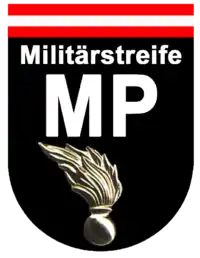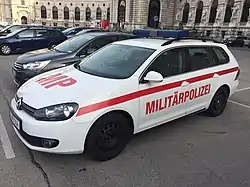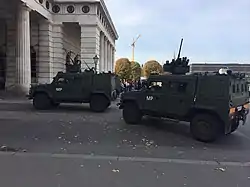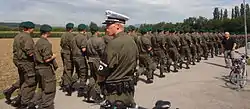Military Police (Austria)
The Austrian Military Police (German: Militärpolizei) is the branch within the Austrian Armed Forces tasked with law enforcement and the protection of the forces, military events and Austrian Armed Forces property. The increasing number of international operations with the participation of Austrian soldiers and new threat scenarios hugely expand the spectrum of tasks.

Military Police Command
The Austrian MP Command, located in Vienna, consists of the following elements
- Military Police HQ
- Fundamentals Division
- Training Division
- Signal platoon
- Personal protection
- 3 MP Companies
- MP militia
MP Companies / Locations
One MP HQ in Vienna, one in Graz and one in Salzburg, each composed of the following elements
- HQ element
- Special tasks
- Supply element
- 3 MP platoons

Tasks
Additionally to its traditional domestic tasks, the formation now also fulfills tasks in international operations. In Austria the Military Police is only tasked with internal Armed Forces matters Abroad, the Military Police is tasked with extensive assignments. It closes the security gap between a conflict that has ended and a functioning society. A large number of experienced specialists and modern equipment are required to meet these demanding tasks.
National tasks
- Check routines and security checks
- Security duty
- Traffic control
- Personal Protection
- Force Protection
- Law enforcement
- Inquiries

International tasks
Until national police units have been formed, the Military Police is responsible for all tasks which have to be fulfilled by law-enforcement agencies. These tasks are highly diverse and in every field require the employment of specialists with modern equipment.
- Taking down traffic accidents
- Crime scene investigation
- Fingerprinting and photographing
- Interrogations
- Searches/investigations/support in interventions
- Detention of dangerous criminals
- Crowd and riot control
- Operation of detention facilities
- Interventions (Special weapons and tactics - SWAT)
- Personal Protection
- Defence against terrorism
Requirements
- Austrian citizenship
- Completed basic national service in the Austrian Armed Forces
- No previous criminal or disciplinary convictions
- Good vision
- Military driver's license, at least B1
- Security clearance
- Good physical fitness
- Aptitude rating above 5 (= result of the induction process)
- Minimum height: Men: 168; Women: 163 cm
Selection
Professional and militia officers and non-commissioned officers take precedence. (International) experience in command functions of combat units is an advantage. The MP selection procedure can, however, already be undergone after the corporals' course. It is not before the second semester of the NCO training course, though, that the actual training to become a member of the Military Police begins. During the MP selection procedure, the candidates' psychological robustness is especially tested, besides general fitness and the ability to work in a team.
Training
Before admission to the MP selection course, every candidate has successfully to complete basic training 1, 2 and 3 as well as the corporals' course. Having passed the selection course, the candidate is admitted to the first semester of the NCO training course at the NCO Academy. During the second semester the candidate starts MP basic training at the Training Division of the Military Police Command in Vienna, after the successful completion of which s/he becomes a member of the MP.

Basic MP training
- Overpowering a suspect
- Legal provisions
- Traffic control
- Check routines
- Inquiry fundamentals
- Law enforcement
- Weapons Training
- Military hand-to-hand combat
- Medical service
- Procedures in buildings
- Various military driver's licenses
- Radio operator training
- CRC training (duty during demonstrations)
- Search for persons
- Employment in the international MP service
Special training
Basic MP training is followed by special MP training, in which MP members are trained in the task areas they are earmarked for.
- Member of a SWAT team
- Inquiry service
- Close Protection
- Hand-to-hand combat instructor
- Live firing instructor
- Driving instructor
- Dog handler
- SWAT element
- Training to become an operation leader
- Forensic special investigation
- MP snipers
Parts of the training take place in cooperation with the Federal Ministry of the Interior, the Federal Ministry of Justice and the HQ Commandos.
Missions
The Austrian MP participates in the current mission of the Austrian Armed Forces
- in Bosnia and Herzegovina &
- in the Kosovo.
The MP-Command also holds a unit in readiness so that they can accomplish emerging missions worldwide at any time. Such missions could be Close-Protection missions or the evacuation EU citizens.
Weapons
References
- Meier, Joachim (2008). "Das Close Protection Team: Der Militärische Personenschutz im Kosovo" (in German). Official Website of the Austrian Armed Forces. Retrieved 2009-10-18.
- Meier, Joachim (June 2008). "Das Close Protection Team: Der Militärische Personenschutz im Kosovo" (PDF) (in German). http://mgfa.de - Militärgeschichtliches Forschungsamt (Armed Forces Military History Research Institute). Retrieved 2009-10-18. External link in
|publisher=(help) - Baumgartner, Franz (2009). "Militärstreife & Militärpolizei im ÖBH 2010" (in German). Official Website of the Austrian Armed Forces. Retrieved 2009-10-18.
- TRUPPENDIENST Nr. 307; 1/2009 - Die Militärstreife im ÖBH2010; Das Kommado Militärtsreife & Militärpolizei
- TRUPPENDIENST Nr. 306; 6/2008 - Das Close Protection Team im Kosovo
- SOLDIERS RAIDS Nr. 157; Policia Militar De Austria
- EINSATZ Magazin für Sicherheit und Wirtschaft 3.JG.; 2/2008 - Ein neuer Spezialverband des Heeres
- MILIZinfo März 1/2007 - Militärstreife/MP
- MILIZinfo Juni 2/2009 - Militärstreife & Militärpolizei
- NEWS 30/09 - BODYGUARDS im Schatten der Macht
- Öffentliche SICHERHEIT 11-12/08; Rückkehr der flammenden Granate
- POLIZEITUNG 20.Jhg. Nr. 82; 4/2008 - Bundesheer läßt die flammende Granate der Gendarmerie "weiterleben"
- derStandard 11.08.2009; Wenn die Armee zur Polizei wird
- derStandard 09.08.2009; Drogen, Deserteure und Hochgeschwindigkeits-Flucht